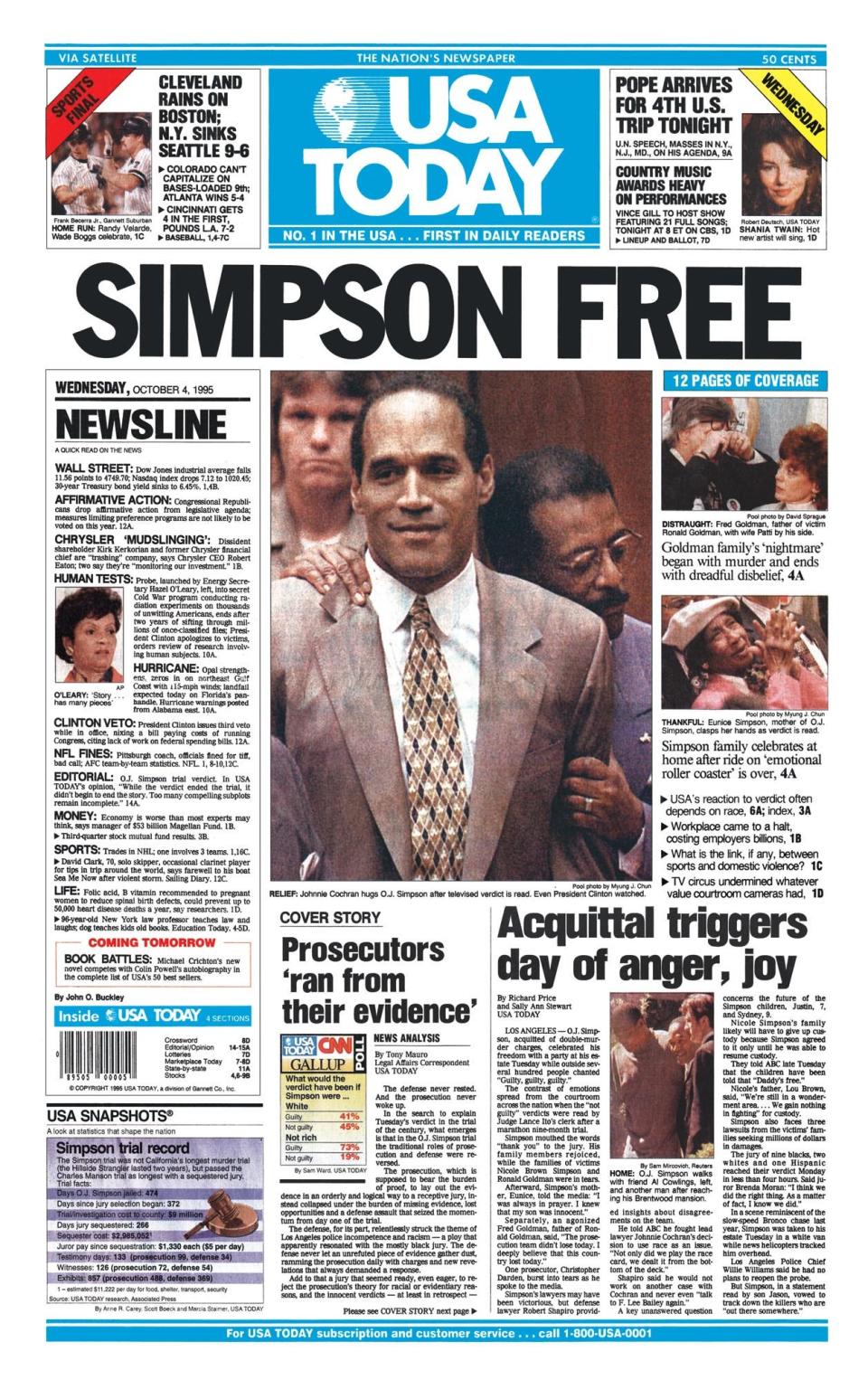Did O.J. escape justice? What the Simpson trial said about race in America, then and now.
I was 7 years old on June 17, 1994, riding my bike around our tranquil suburban neighborhood in Culver City, California. As I rode, I crossed paths with my pal David, who lived around the corner.
David was a big, gregarious kid, happy and kind to a fault. We always got along. He also was white, and I am half African American − details that are meaningless to this story except that they highlight a certain irony. We started riding around the block together.
Suddenly something happened that this pair of suburban second graders had never seen before. The world got loud above us. Our eyes turned upward: Flocks of helicopters spanned out across the clear blue sky. They hovered, almost like the mosquitoes that gathered around the light by our front door.
David and I marveled, wondering what was happening. As we completed our loop around the block, we saw my mother and a cluster of neighbors talking, looking up at the sky as well. David and I rode up to them looking for answers. As we approached, a car sped down the street at considerable speed, and my mom turned, pointed her finger and exclaimed: “That was O.J. Simpson!”
Actually, it was not O.J. Simpson. He did not drive down our street in that famous chase up the 405 freeway as police sought him in connection with the fatal stabbings of his ex-wife Nicole Brown Simpson and Brown’s friend Ron Goldman.
Thirty years later, I'm not even sure my mother did say it was Simpson. David and I both remember the car driving down our street, but in our excitement and our need to make sense of it all, we could have conflated my mother's explanation about why the helicopters were hovering overhead with the events of that day in our own neighborhood.
Even so, that moment, and the false memory it gave us, provided a thrilling seal on my friendship with David. We talked about it for years afterward, sharing the story with other kids. Even after we no longer saw each other regularly, when we did encounter each other, we would always bring up that thrilling day.
The slow-motion police chase of O.J. Simpson brought us closer together in a friendship that transcended race in the joyful ignorance of two American boys.
And there is the irony. Because for millions of adult Americans, what unfolded surrounding the arrest of O.J. Simpson and his trial and subsequent acquittal seared another deep wound into the tissue of social trust that too tenuously binds Black people and white people as neighbors in America.
As a kid, I didn’t have much awareness of Simpson before his arrest. Ours was a baseball and boxing home. I knew Simpson only because of his role opposite Leslie Nielsen in "The Naked Gun" and "The Naked Gun 2 1/2" (favorite comedies for my dad and me back then). And while I remember watching the news coverage with interest, my Black mother’s skepticism of Simpson’s innocence and my white father’s shock at his acquittal, I never closely scrutinized the details of the case.

I know, however, that most Americans believed that Simpson was guilty, and obviously so. And while many Black Americans believed at the time that Simpson was innocent (that has now changed, according to polls), there also were those who hoped for Simpson’s acquittal − whether he was guilty or not.
That was confusing and troubling to me as a young person. My parents believed Simpson was guilty, and my teachers seemed to think that as well. Yet, among many Black people in my day-to-day life, there was a hope that Simpson would not be convicted. The reason I ascertained was because Black people stood by Simpson because he was Black.
Should America be a colorblind society? Debate made me think more deeply about racism.
For Black Americans, justice is weighed on a different scale
It was my first encounter with identity politics at scale, and it made me uncomfortable. I was Black and wanted to identify with Black people. But what did Simpson's guilt or innocence have to do with race? Wasn’t this a question of justice?
In time, I came to see that for many Black people, Simpson's acquittal was a matter of justice − but justice according to a different principle, weighed on a different scale.
Many Black Americans believed that the Los Angeles Police Department was imminently capable of framing a Black man for a crime he didn’t commit. Simpson's arrest came only three years after the Rodney King beating after all, and racially charged comments made by a detective involved in Simpson's case did not ease that impression.
There also was a sense that Simpson's acquittal, regardless of guilt or innocence, was a minor form of payback for all those times innocent Black men and women had been convicted for crimes they did not commit. In that sense, the Simpson case was not "an eye for an eye" but an eye lash for a whole body, many times over.
That is because the Black experience with the American justice system has been, for centuries, loaded down on the side of injustice and unequal application of the law. So much so that the tragedy of Black men falsely accused of rape by white women and then convicted for it almost reads like a trope. An endless stream of examples of white murderers of Black people not brought to justice – from high-profile cases like the killers of Emmett Till to many others that most people will never know anything about – fill a literature unto themselves.
O.J. Simpson trial divided America. Those divisions remain nearly 30 years later.
From the post-bellum South to the era of mass incarceration and disproportionate sentencing rates and penalties meted out in the war on drugs, Black people in America have the collective experience of being falsely condemned by the criminal justice system. Our emotions surrounding the Simpson case were measured against the entire weight of that history, and determined that the acquittal of Simpson would amount to the slightest rebalancing of these historically unjust scales.
I say “our,” although I did not feel that way then or now. I would love to learn that Simpson was actually innocent, but so long as it seems probable that he was guilty, it troubles me to imagine that we might so quickly abandon our commitments to impartial justice in one case because it was not present in others.
If there are double standards in history and the law, they are not rectified by the imposition of new double standards. Yet, that way of thinking seems to be more and more of a general phenomenon of American life in our polarized age.
For many white people, Simpson's acquittal and the celebration of that apparently unjust outcome led to the belief that Black people are more concerned with the interests of their own race than with the objective interests of society.
Opinion alerts: Get columns from your favorite columnists + expert analysis on top issues, delivered straight to your device through the USA TODAY app. Don't have the app? Download it for free from your app store.
That belief underlies the general criticism of identity politics, affirmative action and diversity, equity and inclusion policies. For critics, such policies place racial preferences over merit and objective qualifications.
Yet, affirmative action and DEI exist as a corrective for the systemic undermining of merit and objective qualifications of Black people across American history, which for centuries reinforced the racial interests of white people. One can argue that such policies are no longer necessary, but this history is not far behind us.
Part of the tragedy of affirmative action is that it can undermine other people’s assessment of the credibility of those groups who benefit from it, even as it exists because those same groups have long faced discrimination.
Opposition to affirmative action and DEI policies is then easily seen as perpetuating historic patterns of discrimination in the present day. And the cycle of resentment it breeds is grievous.
O.J. Simpson's death reminds us of the realities of race in America
The O.J. Simpson case was grievous on another level, of course. It centered on the murder of two human beings, and yet the seeming injustice of his acquittal was loudly and publicly celebrated. The challenge of empathizing with the reasons why many Black people felt this way was substantial three decades ago. And it still is.
“I forgot just how polarizing that O.J. case was,” Dave Chappelle said in his 2017 Netflix special, describing how he shook Simpson’s hand in a Beverly Hills restaurant full of white people not long after the verdict. Chapelle said one of his dining companions, who was his friend and his agent, turned to him, looking hurt after Simpson walked away, and said: “How could you shake hands with that murderer?”
The idea that there is a larger historical context to the approval of Black people for Simpson's acquittal was largely the point multiple analysts made on networks like CNN after Simpson died from cancer last week. Empathy must go both ways, however.
It is every bit as important for Black people who may have had a different emotional reaction to the Simpson acquittal to appreciate the feelings of those who were offended and hurt by the outcome. That similar injustices have been routinely perpetrated against Black people for most of American history doesn’t change the fact that we now live with white people as neighbors (and, ideally, family and friends).

Simpson's death brought to mind the realities of race in America, the work we still have to do in understanding each other and the need to vigilantly polish the moral lenses through which we see the world.
But it also gave me cause to remember, in biblical terms, why one must be like a child to enter the Kingdom of God. For children, ignorant of the injustices of the past, tend not to see one another through the tainted lens of history or politics. In such a world, it is easy to be friends.
As adults we must not choose to be ignorant. But we can choose to remember that in the world we wish to see, justice, like friendship, must be colorblind.
John Wood Jr. is a columnist for USA TODAY Opinion. He is national ambassador for Braver Angels, a former nominee for Congress, former vice chairman of the Republican Party of Los Angeles County, musical artist, and a noted writer and speaker on subjects including racial and political reconciliation. Follow him on X: @JohnRWoodJr
You can read diverse opinions from our Board of Contributors and other writers on the Opinion front page, on Twitter @usatodayopinion and in our daily Opinion newsletter.
This article originally appeared on USA TODAY: Was O.J. Simpson guilty? His trial left me confused as a child


